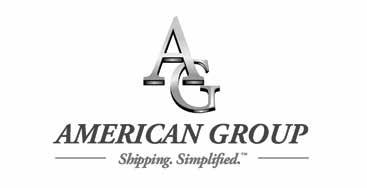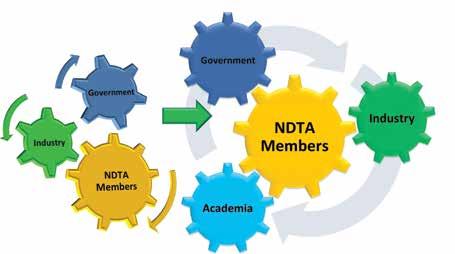
14 minute read
AN EDUCATION STRATEGY TO MEET THE CHALLENGES OF THE NEXT 30 YEARS
Former Chief of Naval Operations ADM Vern Clark was quite fond of saying: “When you stop learning, you start becoming irrelevant.” As if to underscore that point, upon our promotion to Flag rank, he presented all of us newly-minted admirals with a duffle bag full of books, and pushed us into executive-level “mini-MBA” type courses in the months that followed. His goal was to ensure that his senior leadership team didn’t become irrelevant.
Over the past year or so, NDTA has looked at ways to enhance the “education” part of our mission by providing opportunity for our members to participate in more structured learning, beyond just listening to a speaker at one of our meetings. As beneficial and interesting as that may be, we were only reaching a fraction of our membership, and then only for an hour at a time. We weren’t getting there.
Last year’s University Day, held as a part of our Fall Meeting, was our initial oar in the water to up the ante and provide a richer learning environment to our attendees. USTRANSCOM Commander Gen Darren McDew co-sponsored the initiative and provided many of the 20 courses that were offered last year. He absolutely understands the value to his people and to the industry. With his strong backing, we return this year with nearly 60 course offerings and seminars across a wide range of topics. We’re calling it “Transportation University” and enrollment is brisk; as I write this in late summer, some courses are already closed out.
Transportation University is just the start, though. I think there is more we can do to build NDTA’s learning portfolio, and we have been looking at where to go next. Those efforts have led us to explore more long-term educational opportunities which would benefit not only current membership, but future membership as well. We’ve used these guidelines as we’ve gone forward: • NDTA professional development and educational efforts remain principally focused on the transportation component of supply chains while including a broad supply chain management focus. • While our roots are in “Defense,” our strategic aperture widens by recognizing that transportation is the key enabler for three elements of national power: Political, Economic and Military. And, it is enabled by a fourth—Information. • We will develop, design and create linkages, in conjunction with membership and stakeholder partners, to educational and professional development programs and other content to meet member needs. • NDTA should once again become an expert organization in the art and science of professional development and life-long education of transportation leaders and a highly skilled workforce. • NDTA should provide opportunities and resources for “learners” at any point in their personal and work lifecycle, from high school to graduate school, and from entry level to senior executive and the C-suite in government, military, industry and academia. • Great programs require a disciplined When you stop learning… RADM Mark H. Buzby, USN (Ret.) NDTA President WELCOME NEW CORPORATE MEMBERS as of October 6, 2016 American Group is a Certified Small Business entity with big company capabilities. An approved GSA transportation service provider, we have competitive rates on file to support any government vendor requirement. American Group is comprised of transportation professionals with literally decades of experience handling LTL, FTL, LCL, FCL, international, domestic, ocean, air, rail, expedited, warehouse, consolidation and trade show shipments. Clients utilize American Group’s state of the art online Traffic Management Software to manage their shipping processes, allowing them multiple carrier choices on each shipment without the need to call multiple carriers to get a freight quote. Clients can view the status of all their shipments in one website without visiting multiple websites—a time saver. American Group is not the largest nor do we want to be. We strive to be the BEST and have simplified the shipping process for our clients. See Pres. Corner, pg. 34
SUSTAINING • Daybreak Express • Skylease 1, Inc.

By Dan Sulka
This past winter, NDTA embarked on a transformational journey to address the changing needs, interests and challenges of its individual and corporate members, current government stakeholders and future members. NDTA has its roots as a highly active, chapter-based non-profit educational institution, and our leadership recognizes that we must make significant adjustments to how NDTA performs its mission so it can evolve, grow, and thrive. In an effort to keep our members informed and involved, we want to give you a preview of how your NDTA is working to adapt and change in the area of professional education and development.
TF Boyle

WE DELIVER SECURITY When you choose Boyle Transportation, you know your mission-critical shipments are safe and secure. As the best value provider of Transportation Protective Services (TPS) to the Department of Defense, we meet or exceed the most rigorous standards in the industry every day. Your shipment is our commitment. Our uniformed professional drivers are employees — we don’t hand your shipment off to independent contractors or third parties. Every employee at Boyle goes through a rigorous clearance process and receives extensive training. We deploy a layered security approach and specify state-of-the-art safety technology in premium equipment. We monitor every important detail about your shipment and provide continuous updates on the web or via email. Just as important, we ensure you have 24/7 access to mission-critical shipment specialists. We protect your shipments with the best safety and security performance in the industry. Safety performance data is available online from the Department of Transportation. Contact us at info@boyletransport.com for details. We know our service and attention to detail are valued by our military and defense industry customers. Thank you for continuing to place your trust in Boyle Transportation.
A SEA CHANGE Among the profound disruptions of the last 20-30 years, we have experienced: • Severe economic booms, bubbles and busts and their often revolutionary effects on business and the transportation industry • Constant acceleration in the development, adaptation and demand for technologies of all kinds • Emerging and dangerous national security threats, adding complexity to historic challenges to the security of our nation and defending its interests • Continuous, rapid adjustment of government policy, approaches and organizations to its inherent responsibility to address and mitigate threats to the security of the nation, especially at home • Unprecedented change to the fundamental ways people live, work, communicate, learn and view relationships to their employers
EMBRACING CHANGE We at NDTA choose to embrace these changes. Consequently, we are developing an Education and Professional Development Strategy to expand benefits and services to increase our value to you and your organizations. When implemented, this strategy will build upon past successes, while greatly increasing the value of being part of this association. At its heart, the strategy will address the educational and professional development needs of transportation professionals in private industry, and government organizations with a role or interest in the national security of the United States. Transportation is still the key element enabling all elements of our nation’s power to ensure its security.
Figure 1.
PROFESSIONAL EDUCATION IN AN ERA OF LOGISTICS CHANGE From top to bottom, great professional associations are designed and operated with a fundamental mission that starts with providing membership learning and professional growth in a trusted environment. In the transportation professional’s current environment, government and private sector professional education programs and schools are being shortened or combined. There is less opportunity for on-the-job learning, and dramatically fewer funds available to educate and stay current on rapid changes to business and government. More and more of the learning and development effort—both time and cost—is now owned by the individual transportation professional. Company and government professional development or education programs to prepare their workforces for increased responsibility and advancement are fading into the past.
Compounding this challenge for transportation professionals, life today often overwhelms the time to think, absorb, and work through with colleagues what change means to our profession. There is less time for them to take the actions essential, either in private companies or government organizations, to develop and grow in their profession. This is the complex challenge we must help our membership overcome. Education, as a primary stated purpose of NDTA, is becoming an even more important component of our future. It is the key way to increase both perceived and actual value of membership to individual and organizational members—both corporate and government entities—in this environment of fierce competition for resources and professional transport

ers’ time. The education strategy must be game changing and innovative to encourage membership and active participation in all aspects of NDTA.
A PREVIEW OF THE WORKING STRATEGY Based on an in-depth self-examination, we’ve begun to develop a concrete educational strategy. The strategy is being driven by the six strategic thoughts highlighted in this issue’s President’s Corner. Final approval of this NDTA Education and Professional Development Strategy is planned for very early 2017, followed by a five-year implementation plan with set metrics for success.
ENDS, WAYS AND MEANS The strategy design is based on the classic “Ways, Ends and Means” planning model familiar to the military, as well as many strategic planners in business. It is influenced by the work of Dr. Chuck Bamford, author of eight books including the market leading textbooks in strategy and entrepreneurship. He is also an Adjunct Professor at the Mendoza College of Business, University of Notre Dame and Fuqua School of Business at Duke.
The strategy will articulate the “Ends”— a statement of where to go, what to become and what to achieve. The “Ends” will be tangible and measurable. It then will identify the “Ways” essential and core to NDTA operations that will increase our capacity to provide relevant and meaningful programs and other learning opportunities to membership. Finally, aligned to the “Ends” and “Ways,” will be a set of “Means”—specific efforts or tasks necessary to enable or resource the NDTA

educational mission, adapt our operating models and increase membership benefits. A high-level working sketch of this architecture, Figure 1, provides a flavor of how the six strategic thoughts can be translated into a path forward to develop and deliver educational and professional development opportunities to you and your organizations. Keep in mind as you view it, that “Ways” and “Means” can align to more than one “End” and that we have listed just a few of the means needed to power the strategy.
ACCELERATING THE STRATEGY— UNIVERSITY PARTNERSHIPS In April, RADM Buzby accelerated a key “means” of the strategy, consistent with his 2016 goal statement to our Board of Directors. He did not want to miss opportunities while the strategy was under development and being collaborated with association leadership and membership.
He asked for the concept of “University Partnerships” be fleshed out to: • Define possible ways of structuring a relationship with academia • Articulate the alignment of NDTA needs to those of universities offering

programs in transportation, travel, logistics or supply chain management • Identify possibilities for exchanges of services of mutual benefit • Conduct a cost benefit analysis of options
Essential to a potential relationship with a university is the basic expectation of a true partnership versus a new category of organizational membership. During a strategy session with the staff, they observed the University Partnership element of the educational strategy could fundamentally change the NDTA operating model—creating new opportunities and value for NDTA members, corporate members and government stakeholders. This is shown in Figure 2.
WORKING DEFINITION OF A UNIVERSITY PARTNERSHIP As a result of this planning session, we have adapted the following working definition of an NDTA University Partnership so we can proceed with the task of fully developing the concept:
“An NDTA University Partnership is a mutually beneficial, substantive relationship between academia and NDTA—a non
Adventure awaits.
When it’s time to get away, get moving with more savings and rewards with Budget. No matter the destination, get more out of every trip.
Save up to 25% always with BCD # V053905
For reservations and more deals, go to budget.com/recgov or call 1-800-527-0700. For reservations and more deals, go to or call
© 2015 Budget Rent A Car System, Inc.
profit, educational organization historically and continuing to be strongly affiliated with the United States government—dedicated to educational and professional development programs to foster and sustain strong and efficient global transportation and distribution system in support of national security. Candidate universities and colleges will have strong transportation, logistics or supply chain management programs. The intent of this relationship is to encourage and facilitate interaction between organizational and individual members of the NDTA and the academic institutions’ schools, departments and/or individual faculty or students in support of the shared purposes of: 1. Establishing common forums to explore and discuss topics which promote transportation preparedness for peacetime and the elements of national power supporting the national security of our nation in times of conflict 2. Assuring a current and future supply of a professional transportation and logistics workforce for both industry and government through support of undergraduate and advanced education, lifelong learning through professional development, and building bridges to close






skills and leadership gaps needed to be successful in a rapidly changing world 3. Providing active, non-partisan assistance to appropriate government agencies and industry engaged in peacetime and national security transportation preparedness planning 4. Conducting or assisting programs of transportation education, science, research and development, among NDTA’s members and its stakeholders designed to foster efficient use of energy, improve the environment, and increase the safety, effectiveness, economy and responsiveness of transportation industry and supporting ancillary services for the movement of people and goods in times of peace and conflict 5. Fostering the spirit of patriotic goodwill, productive dialogue, cooperative endeavor and mutual understanding among NDTA members, the academic community, the transportation industry, as well as government departments and agencies concerned with transportation.”
CONCLUSION Your NDTA leadership is committed to fundamental and deep transformation to make your association more valuable to you by pro
viding or connecting you to important and relevant education and professional development resources—essential to current and new members of the transportation profession, as well as to our industry members, potential university partners and all government organizations with a stake in transportation and the nation’s security. We will update you as this process works forward. Most of all, please tell us what you think. An association can pay its members no greater honor than asking for their professional opinion, to tell us what they need and to solicit their active assistance in helping their association thrive. DTJ
Dan Sulka is a former transportation/multifunctional Logistics Corps Army Colonel with extensive military and private sector leader development and executive education experience. He has worked in tech industry as a director of logistics and product support and is currently consulting, as well as working for a women’s owned small business as Director of Business Development and Program Management. He is a graduate of the University of Pennsylvania with master’s degrees from the School of Advanced Military Studies and the Eisenhower School for National Security and Resource Strategy.
Proudly supporting the military community and their families.












Leadership Perspectives: The NDTA-USTRANSCOM Fall Meeting and Beyond
MILITARY/ GOVERNMENT
With those challenges in mind, I am focused on evolving USTRANSCOM in ways that ensure we are able to answer the Nation’s call today, while simultaneously preparing for the future. In that evolution, we will need to work together to advocate for tomorrow’s capabilities, extend mission assurance through the cyber domain, and address the fundamental changes happening in our Nation’s workforce.
INDUSTRY
First and foremost, we need to ensure a foundation of trust with our partners. We do this through communication, collaboration and transparency. We must be active listeners. We must articulate the desired outcome and allow all participants to suggest and create solutions. Above all we need to continually educate our people; provide them the tools and the time to learn: for it is through this learning that we will overcome the disruption we will face.




